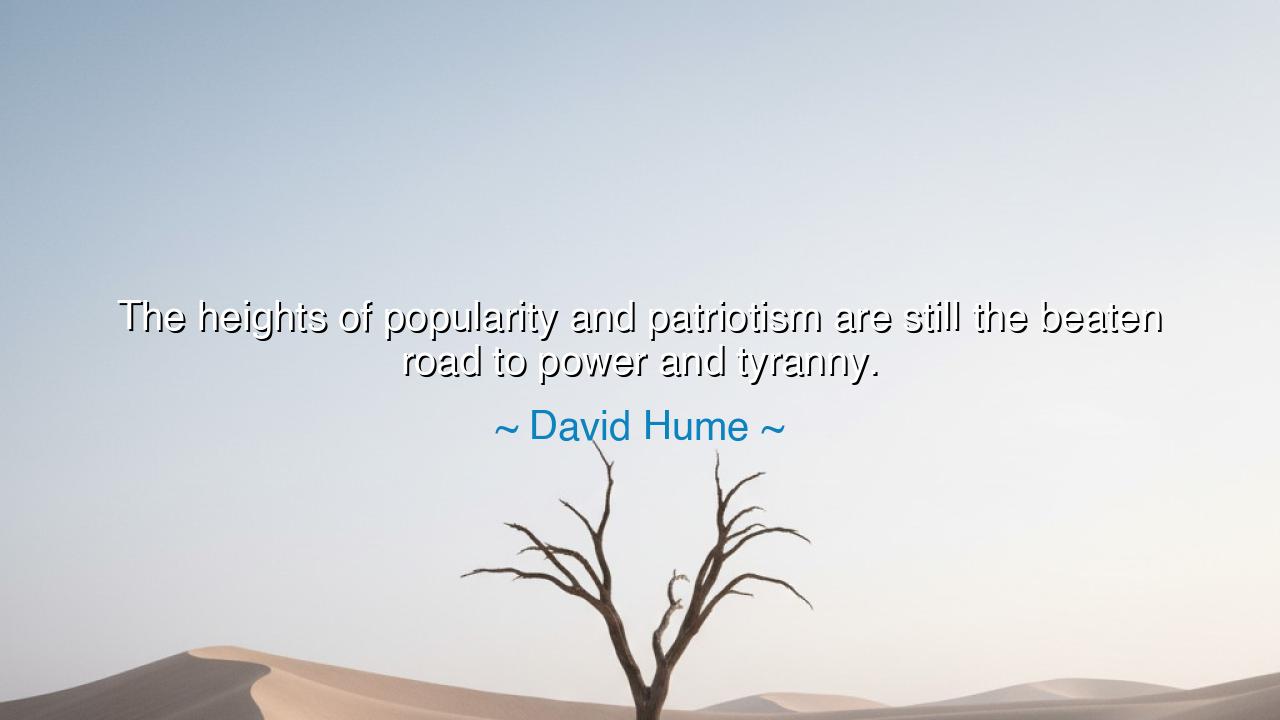
The heights of popularity and patriotism are still the beaten
The heights of popularity and patriotism are still the beaten road to power and tyranny.






David Hume, the philosopher who probed the frailties of human reason and the temptations of power, once warned: “The heights of popularity and patriotism are still the beaten road to power and tyranny.” In these solemn words lies a truth carved from the history of nations: that the very forces which stir the hearts of men—the applause of the crowd and the cry of loyalty to the homeland—are the very instruments by which ambition climbs, and often by which liberty falls.
The origin of this insight rests in Hume’s deep reflection upon the patterns of history. He lived in an age of kings and parliaments, of revolutions and wars, and he observed how rulers often cloaked themselves in the mantle of patriotism to justify their hunger for power. Popularity gave them a stage; patriotism gave them a banner. Together, these became the beaten road—well-trodden, familiar, and deadly—upon which many a tyrant marched, greeted not by suspicion, but by the cheers of the very people he would later oppress.
History is heavy with examples. Consider Napoleon Bonaparte, who rose from obscurity by claiming to embody the will of France. He stirred the people with his victories, basked in their popularity, and wrapped himself in the language of patriotism. He declared he fought for France, yet he crowned himself emperor and led millions to their graves in pursuit of personal glory. The people welcomed him as savior, but he proved to be their master. Hume’s words found flesh in Napoleon’s march from celebrated general to crowned tyrant.
Or recall the fall of the Roman Republic. Julius Caesar crossed the Rubicon proclaiming that he marched for the people, for Rome, for the republic itself. He was beloved by soldiers and hailed by citizens. His popularity was immense, his appeal to patriotism irresistible. Yet in truth, it was but the road to tyranny. Rome’s liberty perished not by foreign invasion, but by the embrace of a leader who promised greatness and delivered dominion. The republic’s death was signed not in secret, but amid the clamor of public applause.
Hume’s warning speaks beyond empires and crowns; it speaks to us, in every age. For the tools of tyranny seldom come as chains in the night. They come as the flags waved in daylight, as the songs of unity, as the leader’s voice promising strength and protection. The crowd cheers, believing itself free, while step by step it yields its judgment to the intoxicating blend of patriotism and popularity. Tyranny is not born in silence—it is midwifed by the thunder of applause.
But his words do not counsel despair; they call for vigilance. Popularity itself is not evil, nor is love of country. Both can be noble, both can inspire courage and sacrifice. Yet they must be watched with care, for when leaders wield them to silence dissent or concentrate power, they become weapons of oppression. The true duty of the citizen is to discern: to ask whether the leader serves the nation, or whether he bends the nation to serve himself.
The lesson, then, is clear: do not be swept away by the roar of the crowd or the fervor of patriotic speech. Question those who rise too quickly on tides of popularity. Examine the deeds behind the words of patriotism. Love your country deeply, but do not give blind loyalty to any man who claims to speak in its name. For the love of country is sacred, but when offered unguarded, it becomes the very fuel of tyranny.
So let Hume’s words be a lamp to future generations: “The heights of popularity and patriotism are still the beaten road to power and tyranny.” Walk that road with caution. Celebrate your leaders when they serve with justice, but resist them when they demand obedience in the name of patriotism alone. For liberty is not lost in one moment—it is surrendered step by step, amid cheers and banners, until the chains are fastened and the people awaken too late. Let us, therefore, guard freedom with vigilance, humility, and courage, so that patriotism may be our strength, and never our downfall.






AAdministratorAdministrator
Welcome, honored guests. Please leave a comment, we will respond soon